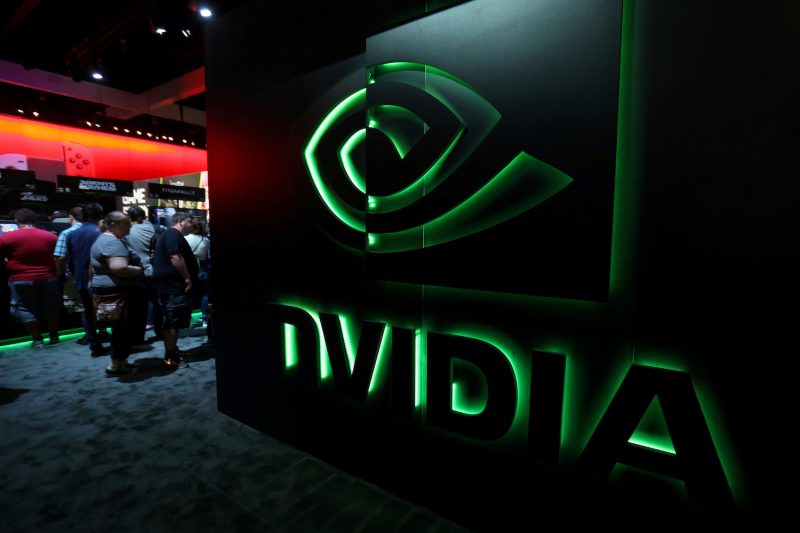US chipmaker Nvidia is planning to tweak its new flagship AI chips to create a version that it could sell to China, even as Washington looks to bring out its toughest trade tools to curb technology flows to Beijing.
The chipmaker — now the world’s third-most valuable company — is planning to develop processors from its new “Blackwell” chip series and sell them in China under the name “B20”, sources familiar with the matter told Reuters.
Blackwell processors combine two squares of silicon the size of the company’s previous offering.
Also on AF: Chinese Firms Accessing Nvidia AI Chips Via Data Centres
Within the series, the B200 is 30 times speedier than its predecessor at some tasks like serving up answers from chatbots.
Selling a version of that chip in China will allow Nvidia to tackle the increasing threat to its position in the Chinese market from local competitors like Huawei and startups like Tencent-backed Enflame.
Huawei’s AI chip — the Ascent 910B — has been widely touted as the closet Chinese rival to Nvidia processors. Last year, the US-sanctioned firm won orders worth millions of dollars as China’s leading tech firms began planning for a future without Nvidia’s chips.
But recent reports indicate Huawei still faces a number of challenges in mass producing its Ascend AI chips, primarily because their manufacturer — SMIC — remains cut-off from advanced chipmaking machines due US sanctions.
Tougher US curbs coming
While the opportunity is immense for Nvidia, its plans to introduce a new China-specific chip comes at a time when the Joe Biden-led US government is seriously ramping up the push to cut-off Beijing from advanced tech.
Last week, Jeffries analysts noted that Washington was set to conduct its annual review of chip export controls and Nvidia’s H20 chip will likely be in the line of fire.
If the US bans exports of the H20 chip to China, Nvidia would see more than a $12 billion hit to its revenue.
The H20 is currently Nvidia’s most advanced chip offering for the China market. The chip initially got off to a weak start when deliveries began this year, with many Chinese firms saying they ‘did not want’ the slower chips.
The led Nvidia to price the H20 below Huawei’s Ascend chips. Sales of the H20 chips have since grown rapidly in China, two sources told Reuters.
Nvidia is on track to sell over 1 million of its H20 chips in China this year, according to an estimate from research group SemiAnalysis.
Raimondo’s commitment
A ban on the H20 would also not be the first time the US thwarts Nvidia’s attempts to sell modified processors to China.
Last year, the US Commerce Department put a stop to exports of some of the first China-specific chips Nvidia designed, including the A100, A800, H100, H800 and L40S.
A month after those restrictions took effect, Commerce Secretary Gina Raimondo asserted she won’t let chipmakers design chips around export controls — a jab directed at Nvidia.
View this post on Instagram
Those moves have hit Nvidia hard in its third-biggest market, where it once accounted for nearly a 90% share of AI chip sales.
China accounted for around 17% of Nvidia’s revenue in the year to end-January, sliding from 26% two years earlier.
Last week, following reports that the US was considering its toughest curbs yet against exports to China, Nvidia lost more than $200 billion in market value in a day.
It remains to be seen what the fate of the company’s new B20 chip will be — for now the processor remains compatible with existing US export controls, sources say.
- Reuters, with additional inputs and editing from Vishakha Saxena
Also read:
Nvidia Calls Huawei Top Rival Amid New AI Chips Push in China
Nvidia Chip Prices Take a Hit in Duel With China’s Huawei
China Firms Rush to Poach Nvidia Clients With AI Chip Offerings
China’s AI Chip Firms Downgrade Designs to Keep Access to TSMC
US Curbs Set Off Sales, Tech Boom for China Chip Equipment Firms
SMIC, Huawei Big Winners as China Ramps Up Chip Funding
Huawei, SMIC Set to Defy US Sanctions With 5nm Chips
Huawei’s China-Made 7nm Chip ‘Years Behind US’, Raimondo Says
ASML Has Sold One in Two Chipmaking Machines to China This Year
The World Needs China’s Legacy Chips, ASML CEO Says
China to Lead 2024 Chip Expansion with 18 New Fabs – SEMI
US Set to Double Tariffs on Chinese Semiconductors in 2025 – TH























